Last week, I shared the idea of a “productive frontier.” When you’re below the frontier, you can usually get more done simply by optimizing your systems. Cut out the waste and be more productive. When you’re at the frontier, getting more done comes at the expense of other things—like your time off.
One wrinkle I didn’t address in that essay was the role of effort. This matters greatly because a lot of our up-and-down struggles with productivity come from it.
Put simply, for most types of work you can increase your output, without increasing your hours, by upping the intensity of your work. No more watercooler chats. No more lingering over emails as you break a little before getting on with the next task. Just put in a relentless focus on deep work.
And this usually works! We’re rarely working at our absolute maximum level of effort, so we can often squeeze more productivity out of our day by upping the intensity.
Some productivity systems readily admit this. Cal Newport recommends time blocking, which he argues makes about a 2x factor in the amount he’s able to get done. But, at the same time, he’s frank about the intensity—scheduling every moment of your working day takes effort.
In Favor of Working Harder
I tend to lean on the side of working intensely. My book, Ultralearning, is essentially a long argument in favor of more intensive studying methods to get better results.
An intense schedule almost always beats a long schedule for accomplishing the same work. I was able to keep evenings and weekends free during my MIT Challenge because I studied intensively from when I woke up until 5-6 pm.
We can repeat the analysis using Pareto efficiency from last week. Instead of considering just two variables: amount of work done and time off, we can add a third—effort.
Putting aside the difficulty of viewing a 3D graph on a 2D screen, if you squint you can see that as you shift up in effort the frontier expands (up to a point). I’d rather work harder than longer, assuming I can reap the benefits of that extra effort.
Why Do We Struggle to Work Hard Enough?
There are a few reasons we tend to fall into lower-than-ideal intensity schedules with our work.
One is incentives. If you’re paid hourly (or on a salary, with the expectation that you are at work from 9-5), then adjusting hours determines your pay. Work overtime or start working part-time and your pay adjusts instantly. Intensity, in contrast, may only manifest itself in your long-term promotability. Nobody pays you directly for working harder.
Frederick Taylor, whose controversial work in “scientific” management can be seen as an origin point for modern productivity discussions, noted as much in his initial studies. Factory workers often “soldiered” or found ways to work at a much more relaxed pace than was possible.
But this wasn’t irrational. Working harder often simply meant raised expectations. Even if they were paid a piece rate, higher productivity usually resulted in management lowering the piece rate so workers were worse off.
Taylor’s solution was to make sure high-wages corresponded to high output, and to have clearly investigated standards as to what level of output was actually possible. Whether workers always shared in the benefits of increased productivity is arguable, but Taylor’s intentions were noble.
Incentives can explain laziness, but they’re hardly the only factor. Students frequently use inefficient methods, even though they’re the ones who will suffer if they get bad grades. Freelancers and entrepreneurs can be notorious procrastinators, even though their lowered productivity directly translates to their income.
A Brief History of Working Harder
To understand the psychology of effort, we need to rewind the clock. Human beings have, for most of their time on this planet, lived as hunter-gatherers. This mode of living, then, has been the driving force in setting the defaults in our mental hardware.
Many of our modern ailments come about because these defaults no longer match our environment. In prehistoric times, sugar was rare and when it was found (such as in a honeybee hive), it usually had to be consumed all at once. Modern humans have an endless supply of sweets, so we struggle with our weight as an unintended consequence.
This discrepancy affects our effort as well. Compared to the farmers who largely replaced them, Paleolithic life was pretty relaxed. These prehistoric peoples were taller, had more nutritious diets and worked a lot less. Some researchers have even argued that agriculture was humanity’s greatest mistake—replacing the garden of Eden for a life of toil.
What this means is that we’re not designed to be particularly hard working. Farming societies overcame this default with cultural exhortations to work hard and social norms about when to work (and when to take time off). Plus, the relative poverty of pre-industrial humans made sure there was a strong incentive to work hard—if you didn’t, you often starved.
In our more recent affluence, our hunter-gatherer psychology is more assertive, and with it a relative disinclination for putting in hard work. We can overcome this when social norms push us to, but in less traditional environments, these cultural forces are often lacking.
The result is that we tend to work less intensively than we should, even if we expect to reap 100% of the rewards of our hard work.
Can You Work Harder?
Despite the tone of this article, I’m not actually optimistic that we can work harder simply by recognizing this fact. Our motivational hardware is largely unconscious. Conscious intentions are merely a ripple against a vast tide of habits and hardwired impulses.
What tends to result is a bobbing up and down of motivation. We feel guilty for not working hard enough, so we ratchet up the intensity for awhile, get a lot done and then, feeling satisfied, revert back to our lazier instincts.
Having a compelling reason to be productive can increase the intensity. When I was getting my business off the ground, I found it much easier to be intensely productive, simply because the goal was very compelling and a less productive effort might not have succeeded.
Big ambitions can result in greater productivity. This is a good reason to set big goals, but it also implies that when your ambitions are relatively modest (or the focus of your life is less on work) then getting the threshold level of intensity for optimal productivity can be harder.
Working Harder in Bursts
It’s natural to have cycles of productivity—moments where you increase the intensity, get a lot done and then have your intensity fade back. This tends to work better when you can take advantage of the slower phase by taking time off to relax completely. But scheduled vacations don’t always perfectly overlap with our effort.
Rather than resist this cycling, I think it makes sense to admit its existence and try to incorporate it into your plans. Daily, weekly and longer-term cycles of energy can be taken advantage of to make progress on projects. If you factor these into your goals, you can avoid feeling disappointed when heroic levels of effort prove unsustainable.
Making Effort Easier
Another strategy is to work on your systems so that effort becomes easier. Since effort is, at least in part, an implicit calculation of opportunity costs, we can make our harder tasks easier by minimizing the salience of alternatives. Reading books on your phone is a lot easier if you don’t have Instagram a swipe away.
Start-up effort costs in unpleasant tasks are also a major source of reduced intensity. If you can make it easier to get started with your deep work, you can get more of the benefits of intensity without requiring as much motivational juice to get started.
Limits to Working Harder
Increasing your working intensity to get more done is good. To the extent that you can reap the benefits of your hard work, you should probably try to do it. Optimizing your regular cycles of effort and designing systems that encourage it are strategies worth trying.
But the exhortation to work harder doesn’t escape the reality I mentioned before. Eventually, we all hit a productive frontier and optimizing hits diminishing returns. This mandates making hard choices about what to work on, what to ignore and which values are central to your life and shouldn’t be sacrificed.


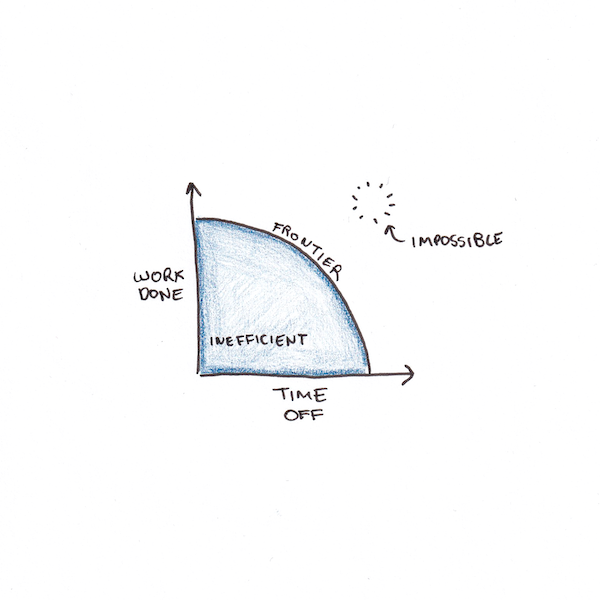
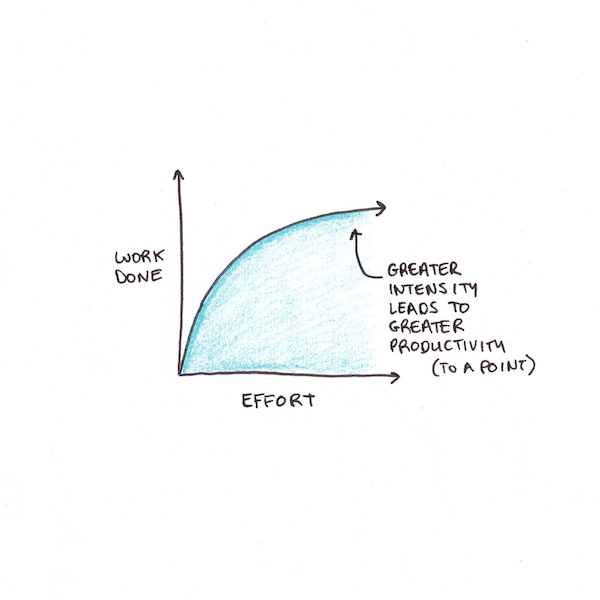
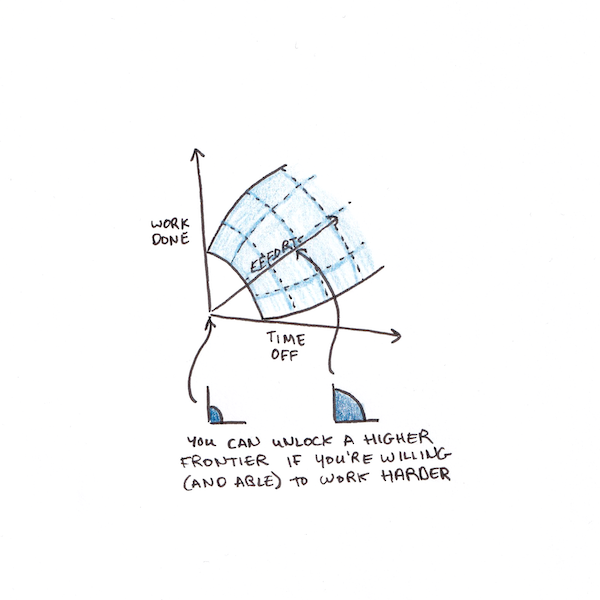
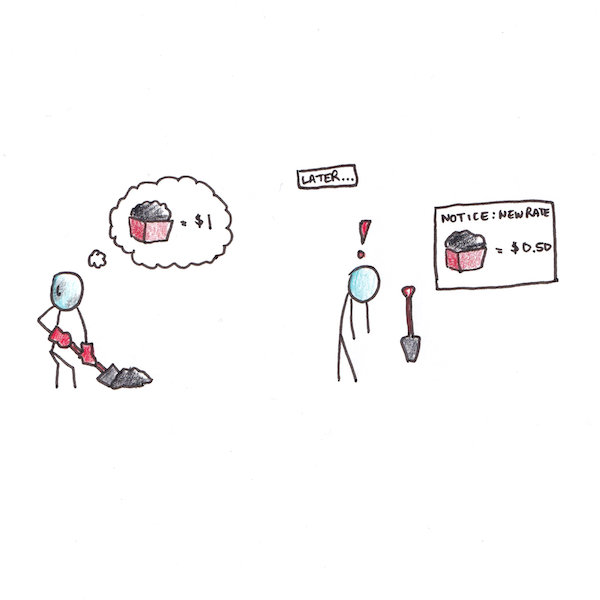
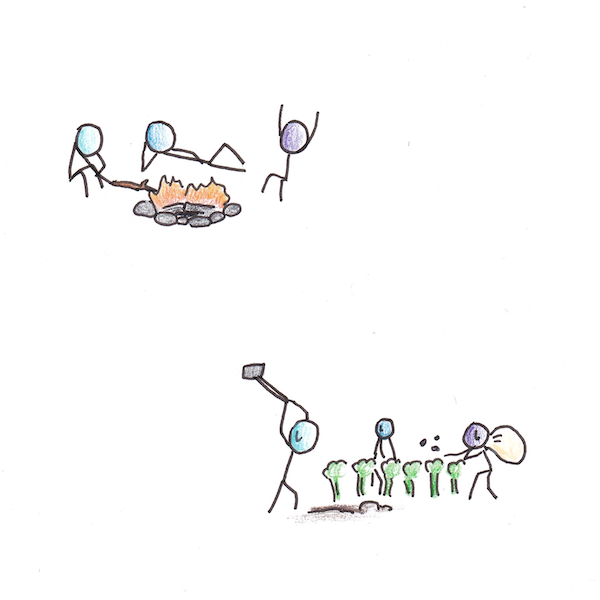
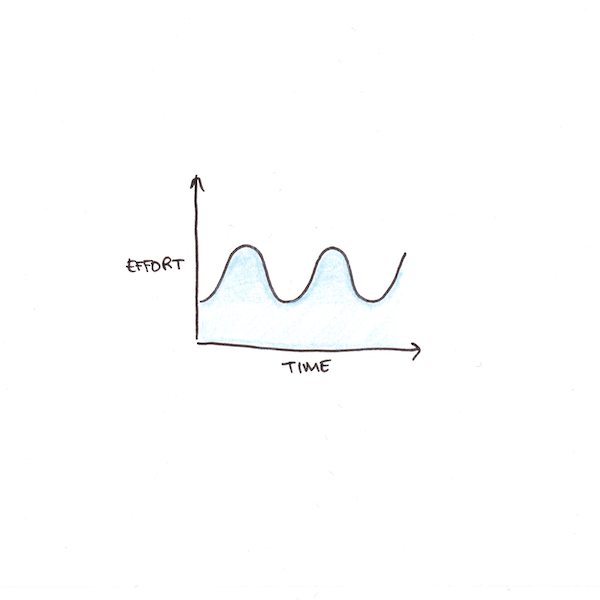
 I'm a Wall Street Journal bestselling author, podcast host, computer programmer and an avid reader. Since 2006, I've published weekly essays on this website to help people like you learn and think better. My work has been featured in The New York Times, BBC, TEDx, Pocket, Business Insider and more. I don't promise I have all the answers, just a place to start.
I'm a Wall Street Journal bestselling author, podcast host, computer programmer and an avid reader. Since 2006, I've published weekly essays on this website to help people like you learn and think better. My work has been featured in The New York Times, BBC, TEDx, Pocket, Business Insider and more. I don't promise I have all the answers, just a place to start.